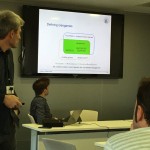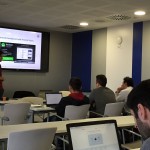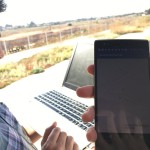Christoph Schlieder and Thomas Heinz from the Research Group on Computing in the Cultural Sciences, University of Bamberg, Germany (http://www.geogames-team.org/) gave a quite interesting 2-day course about geogames design and implemation. The first day there was an introductory presentation on Geogames, location based applications and its components. Some examples of gamification in a location based application were also shown, including Geoguessr, where you have to guess the location of a set of random pictures; and Geocaching, where there are treasures hidden in the real world, and only with the coordinates and some hints you should find them. In both cases you should try to get the best score by guessing the location or by finding more treasures. There was an explanation of two of their own Geogames, and after a demonstration, where we played with real devices on the campus of the University. The goal of the first one was to guess the distance between your current location to some buildings inside the campus. And the second game was a poker card game in which to change the cards in your hand you should move to an specific location in the campus; we were playing in two teams and the one who had better hand when the time was over won.
seminar.
UJI organizes a Geogames seminar
In the context of Geo-C program, Geotec is organizing a geogames seminar for the next week (23 and 24). The seminar will take place in ESPAITEC II, Sala multiusos, 2nd floor (http://smart.uji.es/index.php?room=UB1206SM). And it will be taught by Christoph Schlieder and Thomas Heinz from the Research Group on Computing in the Cultural Sciences, University of Bamberg, Germany (http://www.geogames-team.org/).
Open Science And European Open Access Policies In H2020 – A FOSTER Seminar
The 12th of February the training seminar “Open Science and European Open Access policies in H2020” took place at UJI. The seminar was organised by UJI in conjunction with the project FOSTER (Remedios Melero) and with the collaboration of OpenAire project (Pedro Príncipe). It consisted in two main sessions. The first one was an introduction to what Open Science & Open access is and the role of OpenAire. The second part of the seminar was mostly based on creating a Research Data Management plan.







